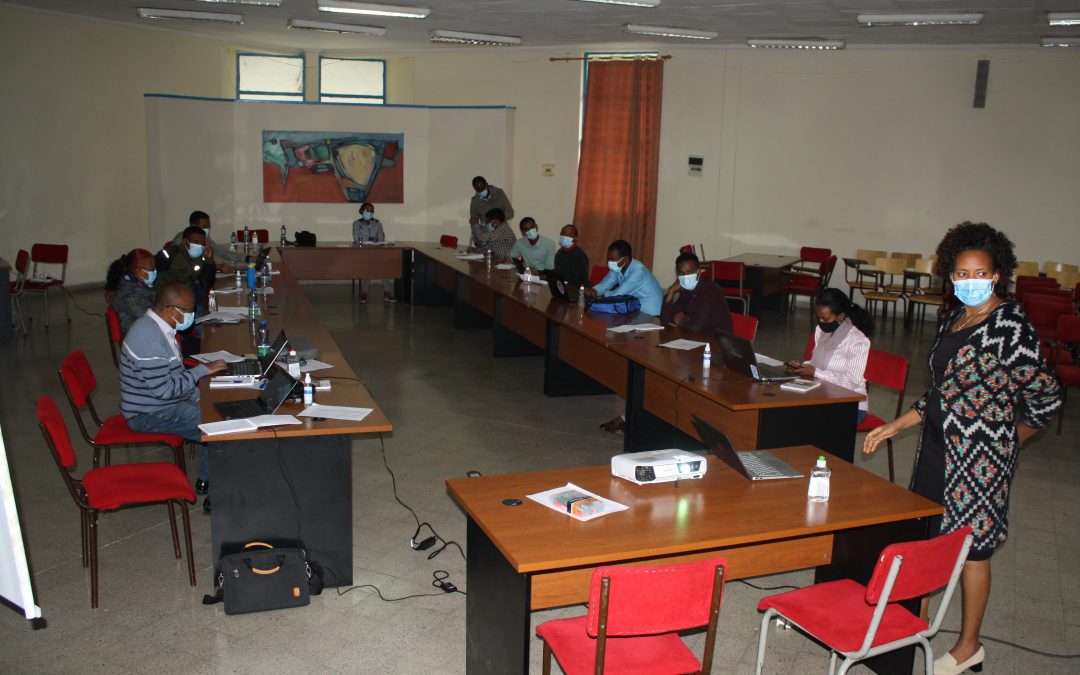In July, an inception workshop for the project ‘Enhancing the Sexual and Reproductive Health (SRH) and Livelihood Prospects’ of youth was held at a DSW youth development training center. The team discussed the detailed implementation modality of the four-year project financially supported by the SAfA (Stiftungsallianz für Afrika, gGmbH – Foundations Alliance for Africa), a valued global partner of DSW. The project, in which DSW receives financial and technical support from its partnership with SAfA, and which focuses on the SRH and livelihood prospects of youth aged 15-19 in Ethiopia was intensively discussed over the two-day workshop. The sessions of the workshop were split into two phases, including a series of activities as well as group work plans.
Topics such as the overall SAfA program from a global perspective, the SAfA project within the specific timelines of country-based implementation and the key strategies tailored to guide the implementation modality were covered during the first day. The second day of the workshop addressed activities, among others, group work plan of actions divided along two regions in each of which activities and target beneficiaries are evenly distributed. The monitoring tools, induction, finance and administrative issues were subsequently discussed toward the end of the workshop.
The inception workshop presented the core thematic focuses, each being distributed according to different areas of expertise across the three partners allied under the broader SAfA supported program. The fourth aim is to generate synergy between the three partners. “The four frameworks of objectives are qualified in terms of outcomes”, says Abebe Demisu, DSW’s program & project department manager in Ethiopia. He further noted that “the first three of these outcomes are described as: economic improvement of the youth by way of gainful employment in agricultural value chains; supply chain management for young people and other actors through higher learning, vocational trainings and consultancy in areas of logistics; enhancing the SRHR and livelihood prospects of youth”.
Among the three outcomes, DSW has focused on sexual and reproductive health and rights (SRHR), which is the thematic intervention that DSW will undertake in Ethiopia over a four-year period. The fourth one is essentially set to draw expertise in synergy from each of the three partners, namely Hanns R. Neumannn Stiftung (HRNS) Ethiopia, Elias Melake Foundation and DSW. “In an effort to broaden the impact of each of the three outcomes, the forth outcome is framed as an efficient high-impact development approach to youth empowerment, which is established and positioned for further scaling-up and replication of good practices”, Abebe explains.
In his opening speech presented at the inception meeting, Feyera Assefa, country director of DSW Ethiopia put into context SAfA’s global programmatic aspect in line with the vital project activities being overseen at the national level. He emphasized, “we have four key objectives essentially tied to the ultimate success of this project depending on how consistently they shall be addressed from the very inception of the project”.
Creating the common understanding of SAfA was one of the four talking points objectively addressed in which the expected results and work-life balance in terms of safety were discussed. The second point of discussion was about the understanding of DSW’s working processes that includes communication and procedures more specifically from the aspects of SAfA related activities and DSW’s own in general. The gender issues within the frameworks of ethical codes of conducts and the whistle-blowing policy were discussed at length during the workshop. The third and fourth talking points focused on creating a strong collaborative and functional team for the SAfA project and articulating the work plans on how best to implement SAfA consistently in line with the interests of both donors’ and government stakeholders’ objectives.

“Objectives matter,” says Feyera, noting that “if we align our activities undertaken here to the objectives of the global perspective set by SAfA, we will be able to maintain our capacity all the way through the entire phase in implementing this project. This project not only requires continual undertaking of various activities over the four-year period henceforth, but it also quests for strong outcomes and impacts on enhancing the SRH and the livelihood prospects among youth aged 15 – 29 who reside in the two most populous regional states in Ethiopia. Thus, our resolve to meet the objectives of this project shall not settle for less than 100 percent success stories, come April 2025”.
“Objectives are set out to be attainable as long as the right strategies are in place and being made good use of as guides through meeting them. Youth empowerment strategic approach (YESA) is a conceptual framework for the SAfA project implemented in Ethiopia that guides the activities to meet the core objectives tied to the project,” accentuates Fekadu Jaleta, DSW Ethiopia’s resource mobilization & partnership department manager.
Enhancing the SRH and livelihood prospects of young people in Ethiopia is a four-year project aiming to benefit more than 73,000 youth aged 15 to 29 in the Amhara and Oromia regions. The project sets out to reach 155 kebeles (lowest local government administrative structure), which are distributed across four woredas (districts). SAfA, a global partner in development, has supported the implementation of this project. DSW in partnership with the HRNS Ethiopia and the EMF will contribute through the implementation of the SAfA program under three separate thematic focuses undertaken across three different projects in Ethiopia.
Photo: ©DSW

